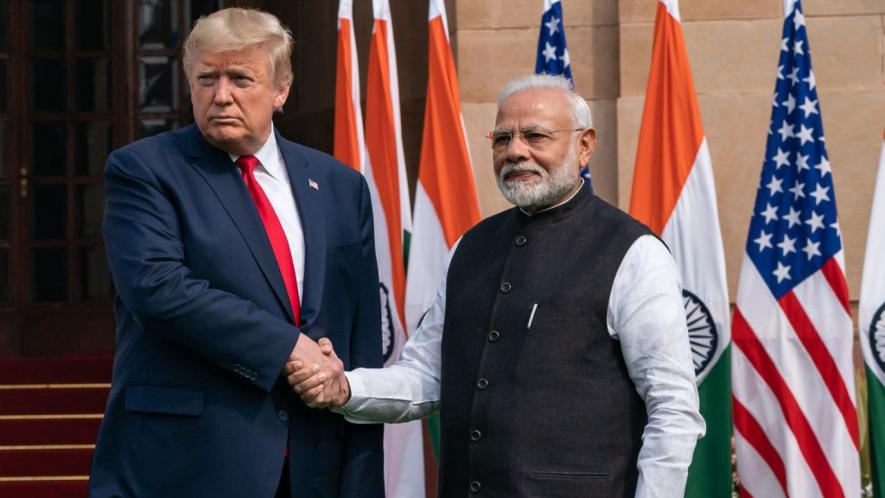Globalisation Sans Justice: India’s Abdication of Voice

Image Courtesy: Flickr
On July 24 and 25, 2025, US President Donald Trump, addressing an AI (artificial intelligence) Summit in Washington, issued a public rebuke to America’s tech giants. His message was both pointed and provocative: stop hiring in India. He accused US firms of betraying the American worker by outsourcing manufacturing to China and software development to India. Resurrecting the “America First” slogan, he warned that those days were over.
What may have once been dismissed as campaign theatrics has now translated into policy directions, and a set of executive orders linking federal funding for AI infrastructure to domestic job creation. Companies, such as Google, Microsoft, Apple, and Meta, were directly named. The new executive framework, as outlined, discourages offshoring and compels firms to demonstrate hiring commitments within US borders.
These developments hold disturbing implications for India’s technology workforce, for its service export model, and more broadly, for its developmental trajectory. The rhetoric is already reshaping corporate conversations, stock market expectations, and boardroom strategy.
Indian IT majors, such as TCS, Infosys, and Wipro, are deeply embedded in US-centric contracts and supply chains. The prospect of a hiring slowdown or even a hiring freeze from American clients has direct consequences. In fact, shortly after the summit, TCS laid off 12,000 employees, citing project delays and uncertainty in global demand. While no official link was drawn to Trump’s remarks, the timing is hardly coincidental. For thousands of young Indian engineers, particularly those emerging from non-elite institutions in smaller towns, the promise of a stable job in the IT sector is already under threat.
India’s globally integrated IT services industry has long been held up as a symbol of its successful engagement with the world economy. Employing over 4.5 million people and contributing nearly 8% to national GDP (gross domestic product), the sector has provided a vital cushion in a landscape otherwise marked by agrarian distress, informal labour, and uneven industrialisation.
But this success story has always been vulnerable to shifts in global political winds. The recent developments reveal just how fragile the edifice is. As the tide turns toward techno-nationalism, the Indian growth model anchored in offshore services begins to look less sustainable. The threat is not merely cyclical; it is structural.
This moment demands a reckoning not only with the present crisis, but also with the historical architecture of globalisation itself. The integration of countries like India into the global economy has always been partial. While capital was allowed to move freely, and goods and services found open markets, labour remained bound by borders, constrained by quotas, and ultimately disposable when politically inconvenient.
The vision of globalisation as a shared and inclusive process has, in reality, been marked by asymmetry. The Global South was asked to open its markets, liberalise its policies, and provide a compliant workforce, but was never allowed equal voice or mobility within the system it helped sustain. It was globalisation for capital, but not for people. The recent turn in US policy is not a sudden deviation, but a logical consequence of this unequal order. The doors are slammed shut precisely at the moment when the South began to ask for fairer terms.
India, in particular, must now confront the consequences of having built its service economy on an unstable foundation. The reliance on US demand, H-1B visas, and favourable sentiment from American corporations has come at the cost of strategic autonomy. If Washington chooses to insulate its labour market and decouple from global sourcing, India is left without viable alternatives.
The potential consequences are far-reaching. Offshore hiring may contract, leading to wage stagnation and reduced job creation. The brain-drain, once seen as a soft power asset, may accelerate toward more welcoming geographies, such as Canada or Germany. Technical education, especially in non-premier institutions, may lose its sheen as placement prospects diminish. And the middle-class upward mobility that was built on the back of IT exports, may begin to erode, deepening existing inequalities across region, caste, and class.
In the face of these developments, the Indian government’s response has been one of calculated silence. There has been no public statement from the Ministry of External Affairs, no outreach to US interlocutors, no defence of Indian professionals who have contributed significantly to global technology development. The foreign policy establishment appears more invested in high-profile visits and symbolic gestures than in the substantive task of safeguarding the country’s labour interests.
Even the Opposition has failed to articulate a coherent response, revealing a troubling consensus around passivity. One cannot help but contrast this with the assertiveness shown by smaller economies, such as Ireland or Mexico, which have openly challenged Western policy moves that threatened their economic models.
India’s reluctance to speak out is often justified in the language of diplomacy. Given the ongoing defence and strategic alignment with the US, particularly within the Quad, many argue that discretion is prudent. But this discretion, when it consistently overrides economic justice, begins to look less like diplomacy and more like deference. It signals to the world that India will prioritise optics over outcomes, and headlines over the hard work of protecting its people’s livelihoods. The quietism that masquerades as maturity is, in truth, a form of strategic subordination.
The political costs of such a stance are likely to manifest sooner rather than later. As faith in the government’s ability to secure jobs and stable growth weakens, public disillusionment will grow. Investor confidence in the skills economy may falter, and India’s image as a digital powerhouse may begin to dim.
Perhaps, more critically, India’s failure to articulate its position in multilateral forums such as the World Trade Organisation, International Labour Organisation, or G20 further undermines its standing in the Global South. It is a tragic irony that India is more vocal in defending its image in foreign documentaries than in defending the employment rights of its own citizens in the global economy.
What is needed is a reorientation of India’s tech diplomacy towards a worker-centric framework. This would involve publicly defending the rights of Indian professionals in foreign markets, building strong coalitions with like-minded countries on digital labour mobility, and diversifying partnerships beyond the traditional US-centric axis. It would also require investing in domestic job guarantees and active labour market policies to absorb potential displacement. Above all, it would demand that India move beyond the illusion of global partnership based on silent compliance and instead embrace a principled internationalism rooted in dignity, reciprocity, and economic justice.
Trump’s call to stop hiring in India is not merely an American campaign slogan. It is a symptom of a world in retreat from multilateralism, from cooperation, and from the promises of shared prosperity. It reminds us that globalisation, in its current form, was never neutral. It was always shaped by power, and that power was never equally distributed.
For India to remain relevant in this new world, it must speak, it must act, and it must resist. It must not concede the space it has fought so hard to occupy, not for the comfort of diplomacy, nor for the illusion of stability. Silence may serve the interests of a few, but it cannot serve the aspirations of a nation.
Shirin Akhter is Associate Professor at Zakir Husain Delhi College, University of Delhi. The views are personal.
Get the latest reports & analysis with people's perspective on Protests, movements & deep analytical videos, discussions of the current affairs in your Telegram app. Subscribe to NewsClick's Telegram channel & get Real-Time updates on stories, as they get published on our website.
























